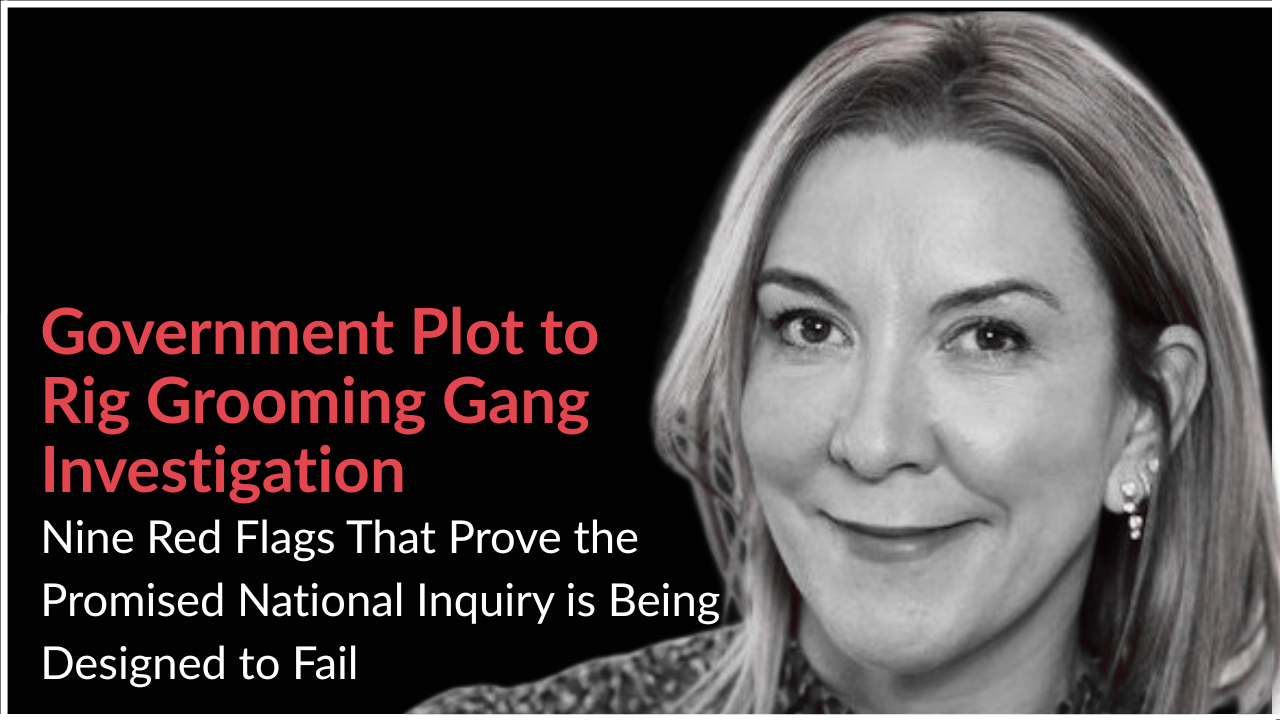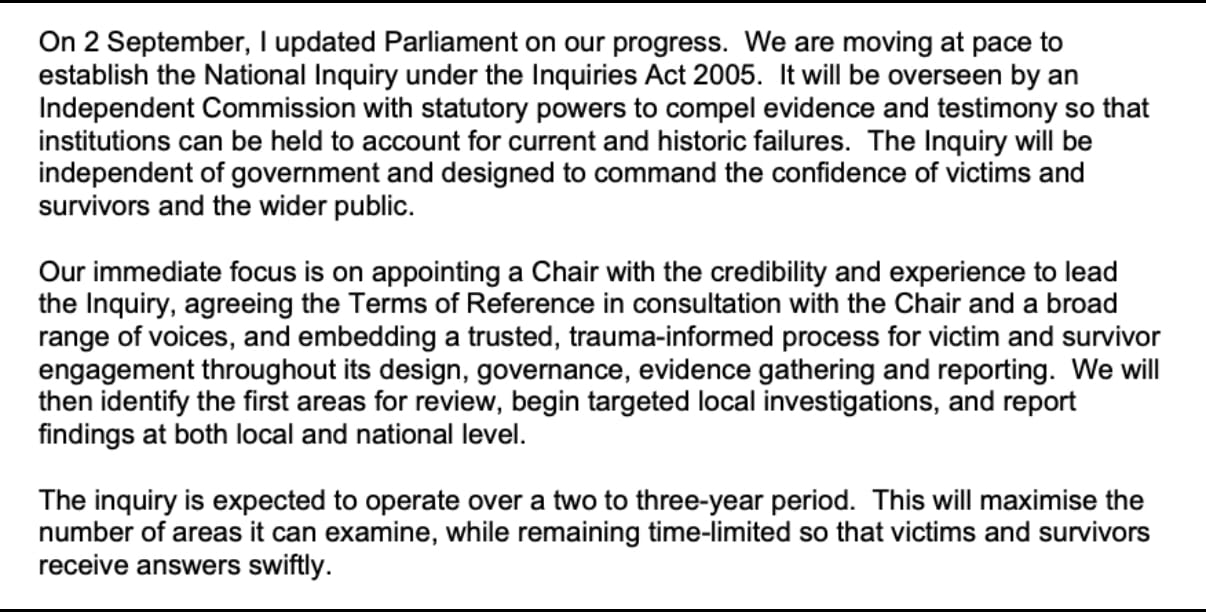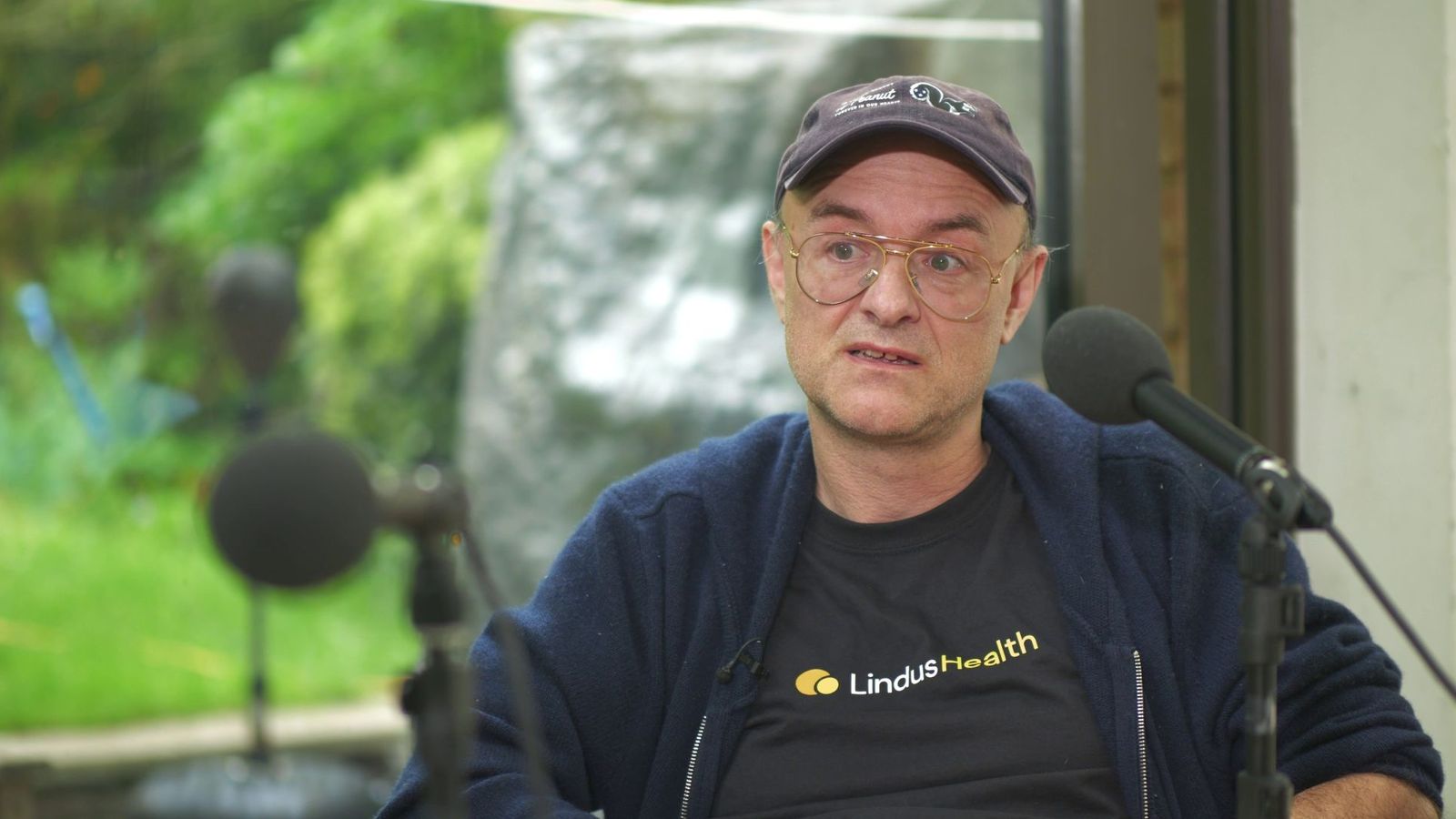Exposed: Government Plot to Rig Grooming Gang Investigation

Nine red flags that prove the promised national inquiry is being designed to fail
According to reports, the government is preparing to announce the appointment of a Chair for the national Rape Gang Inquiry. Two candidates have been shortlisted, with a survivor panel set to meet them before the final decision, one that will ultimately rest with the Prime Minister and his Home Secretary.
Some will call this progress. But what we are witnessing is not transparency but choreography.
Below are nine reasons this inquiry is already compromised before it even begins.
A Survivors' Panel Without Independence or Competence
The government has created what it describes as a "survivors' panel" to provide legitimacy for its chair selection, but this represents manipulation rather than meaningful consultation. While survivor inclusion must be central to any legitimate inquiry, it must also be independent, structured, and transparent. What we have instead is a small, unnamed group whose very existence appears designed to provide political cover.
The Home Office has refused to disclose how panel members were selected, what expertise or representative authority they possess, what safeguarding standards govern their participation, or how they can claim to speak for the thousands of survivors across affected communities. No independence protocols have been established. No framework for their involvement has been published. Even their identities remain secret.
This approach violates every established convention for survivor involvement in major inquiries. In the Grenfell Tower Inquiry, survivors gained legal representation, published participation frameworks, and formal rights to question evidence. The Post Office Inquiry similarly provided transparent structures with independent oversight and dedicated advocate support.
The contrast reveals the true purpose of this "survivors' panel." Rather than empowering survivors to shape the investigation, it exists solely to rubber-stamp the government's pre-selected Chair. Meaningful survivor empowerment would include independent legal advocates, published meeting minutes, formal questioning rights, and transparent selection processes. Instead, survivors are being used as human props to legitimise a compromised process they have no real power to influence. This represents exploitation masquerading as consultation, emotional theatre designed to deflect criticism while maintaining political control.
No Cross-Party Oversight of Recruitment
The government has deliberately excluded opposition parties from a process that constitutional convention demands should transcend party politics. Every major inquiry with national implications has included cross-party consultation during chair recruitment, recognising that public confidence requires broader political legitimacy than a single party can provide.
The precedents are clear and consistent. The Grenfell Tower Inquiry involved extensive dialogue with local representatives and survivor groups across party lines. The COVID-19 Inquiry was shaped through formal briefings to opposition parties to maintain credibility across the political spectrum. The Hillsborough Independent Panel was established through explicit cross-party agreement.
This rape gang inquiry breaks entirely with these established conventions. The process is being conducted in secret by Home Office officials answerable only to Shabana Mahmoud and Keir Starmer, both of whom have direct political interests in limiting the inquiry's scope and protecting senior Labour figures from accountability.
There has been no parliamentary oversight, no published appointment criteria, and no transparency about who sits on the selection panel. Opposition parties have been deliberately frozen out of decisions that will determine whether this becomes a genuine investigation or another establishment whitewash.
This represents a fundamental breach of constitutional practice. The government has transformed what should be a national reckoning into a private management exercise conducted behind closed doors, designed to maintain political control rather than ensure independent investigation.
Draft Terms of Reference Before a Chair Is Appointed
The Home Office has fundamentally corrupted the inquiry process by writing its terms of reference before appointing a chair, violating both the letter and spirit of the Inquiries Act 2005. Section 5 of this law explicitly requires that a chair must be consulted on terms of reference before they are finalised, ensuring independent input into the inquiry's scope and mandate.
Yet reports confirm that the government's draft terms are already "more or less in place" despite no chair having been selected. This procedural inversion represents far more than administrative error, it constitutes a deliberate power grab designed to constrain whoever eventually takes the role.
By pre-writing the terms, the Home Office has ensured that the future chair will inherit predetermined limits on what they can investigate, what evidence they can pursue, and what conclusions they can reach. Rather than allowing an independent chair to shape the investigation according to evidence and need, officials have created a straitjacket that will bind the inquiry within politically acceptable boundaries.
The identity of those who drafted these secret terms raises equally serious questions. Were survivor groups consulted? Were police whistleblowers or campaigning organisations invited to contribute? Or were the same civil servants who worked on discredited reviews such as Andy Burnham's Oldham Assurance Review quietly defining the limits of what must never be examined?
A chair who inherits a pre-drafted mandate cannot claim independence. They become merely an administrator implementing the Home Office's predetermined agenda, lending judicial credibility to what amounts to a politically managed exercise in damage limitation.
A Chair Chosen for Compliance, Not Courage
The recruitment process for the Chair reveals a government more concerned with political control than independent investigation. Four months after announcement, we still have only a "shortlist" of two candidates, a delay that stands in stark contrast to comparable inquiries. Grenfell's Chair was appointed within two weeks. COVID's within six weeks.
The extended timeline becomes more suspicious when examined alongside the complete absence of transparency surrounding the selection process. No role description has been published. The Home Office has refused to disclose how many candidates were initially approached, why others were rejected, or even who is conducting the recruitment. There are no published selection criteria, no information about the appointment panel, and no explanation of the decision-making process. Even the Guardian newspaper has raised concerns of how senior legal figures appear reluctant to head the inquiry.

This opacity is deliberate. It allows the Home Office to filter candidates without scrutiny, ensuring that anyone likely to ask uncomfortable questions about policing failures, political interference, or the conduct of local Labour councils can be quietly eliminated from consideration. The extended delay provides cover for this screening process, allowing officials to find a Chair who will operate within acceptable political boundaries.
A truly independent appointment would have been transparent from the start. Instead, we are witnessing a managed selection designed to produce a compliant administrator rather than a fearless investigator. The kind of Chair this process will produce, a career bureaucrat or establishment insider credible enough for headlines but cautious enough to preserve political relationships, represents compliance in judicial robes rather than genuine independence.
Every additional week of delay increases the probability that this inquiry will be led by someone chosen to manage public outrage rather than uncover institutional truth.
Political Conflict of Interest at the Core
The final appointment decision rests with two politicians who cannot credibly claim impartiality in this investigation. Both the Prime Minister and Home Secretary have direct political interests in containing this scandal rather than confronting its full implications, creating conflicts of interest that would disqualify them from involvement in any genuinely independent process.
Keir Starmer leads a government that quietly endorsed the 2022 Oldham Assurance Review, a document widely criticised for downplaying police and council failings while providing cover for senior Labour politicians implicated in the grooming gang scandals. His party's political survival depends on ensuring that this inquiry never exposes the full extent of Labour's institutional failures or the network of politicians and officials who facilitated decades of abuse through wilful blindness or outright complicity.
Starmer's own role as Director of Public Prosecutions during key grooming gang prosecutions adds another layer of institutional continuity that the inquiry might be expected to examine.
The Home Secretary's position presents even more acute conflicts. Shabana Mahmoud, appointed in September 2025, represents Birmingham Ladywood, a constituency with significant Pakistani heritage populations. Her own Mirpuri-Pakistani background places her within the very community that official reports, including the Casey Review, identified as overrepresented in grooming gang offences. Beyond ethnicity, her political dependence on community bloc support creates powerful incentives to avoid confronting cultural taboos or challenging community leaders who may have enabled institutional silence. She cannot credibly oversee an inquiry that may need to examine these sensitive dynamics within her own political base.
These are not abstract concerns but practical impediments to independent investigation. Both politicians share the objective of controlling the narrative, ensuring this appears to be a responsible and measured response while guaranteeing it never threatens Westminster careers, senior Labour figures, or the civil service network that enabled systematic abuse through institutional cowardice.
The chair appointment process gives them the perfect mechanism to achieve this control. By selecting a compliant establishment figure and approving terms of reference already written within the Home Office, they can dictate the boundaries of accountability before any evidence is heard. This inquiry has been designed not to hold power accountable but to protect the political class from the consequences of decades of betrayal.
A Process Built on Secrecy
The government has conducted this entire process behind a wall of secrecy that violates every principle of transparency required for public confidence in independent investigation. From the initial announcement to the current selection process, officials have systematically refused to provide basic information that would allow public scrutiny of their decisions.
The scale of concealment is comprehensive. There has been no publication of selection criteria for the chair position, no disclosure of how many candidates were approached or why they were rejected, and no information about who sits on the appointment panel or how survivor representation was chosen. The Home Office has refused to confirm even elementary details about timelines, governance structures, or decision-making processes.
This opacity becomes more damning when contrasted with established practice in comparable inquiries. By month three, the UK COVID Inquiry had published detailed frameworks, process notes, and calls for evidence. Even highly sensitive security-related investigations provide basic transparency about their establishment and governance to maintain public legitimacy.
The deliberate absence of information here serves a clear political purpose. Secrecy allows manipulation without accountability, enabling officials to filter candidates, draft terms, and design structures without external challenge or oversight. Documents that might reveal the extent of political interference in the process are being withheld or classified to prevent disclosure.
This culture of concealment directly mirrors the institutional conditions that enabled the grooming gang scandals in the first place. Closed rooms, quiet agreements, and decisions made by people more concerned with protecting reputations than delivering justice.
The inquiry process itself has become infected with the same pathology it is supposed to investigate.
Terms of Reference That Will Define the Cover-Up
The final terms of reference will determine whether this inquiry exposes a national scandal or provides sophisticated cover for institutional failure. The government's own words reveal they have already chosen the latter, with documented changes in official language that systematically strip accountability from the process.
In September, Minister for Safeguarding Jess Phillips told Parliament the inquiry was in its "final stages," would be "completely victim-centred," and that "no stone will be left unturned." Yet by October, in her written response to MP Rupert Lowe, every promise had been diluted through calculated linguistic shifts designed to neuter the investigation.

The Minister for Safeguarding Girls quietly replaced "inquiry" with "commission," "investigation" with "review," and "prosecutions" with "reporting findings." They shifted focus from holding individuals accountable to examining institutions, from conducting a national reckoning to managing "targeted local inquiries."
Each substitution marks a deliberate retreat from justice. "Reporting findings" is the language of bureaucracy, not accountability. Reports do not indict. Findings do not prosecute. Reviews do not deliver consequences for decades of institutional betrayal.
This represents the same formula that failed victims in Rotherham, Rochdale, Oldham, and Telford. A sophisticated cover-up choreography where empathy is performed on camera while justice is strangled by process. The unspeakable is transformed into the administrative, ensuring that those responsible for systematic child abuse face paperwork rather than prosecution.
If these linguistic retreats define the final terms of reference, then the cover-up will have succeeded before the inquiry even opens its doors. The most important questions about individual responsibility, cultural complicity, and political cowardice will be declared beyond scope, buried beneath layers of bureaucratic process designed to protect the guilty rather than deliver justice for survivors.
No Timetable, No Accountability
Four months after the inquiry's announcement, the complete absence of operational progress reveals a government more interested in managing political pressure than delivering justice. There remains no published schedule, no staff recruitment, no operational base, and no concrete timeline for when substantive work might begin.
This operational vacuum becomes more suspicious when compared to the rapid establishment of other major inquiries. The Grenfell Inquiry held preliminary hearings within 12 weeks of its chair's appointment and began taking evidence shortly thereafter. The COVID Inquiry commenced formal evidence collection within six months of announcement, despite dealing with a pandemic that was still unfolding.
The contrast exposes the political calculation behind these delays. Extended timelines serve those seeking to avoid accountability by allowing public pressure to dissipate, media attention to move elsewhere, and institutional memory to fade. Every month of inaction increases the likelihood that key witnesses will become unavailable, that crucial documents will be lost or reclassified, and that officials will have time to coordinate their responses.
This represents strategic decay rather than administrative delay. The government understands that inquiries derive much of their power from public momentum and political pressure. By allowing the process to stagnate, officials hope that by the time substantive hearings begin, the scandal will have moved from urgent crisis to historical curiosity.
The absence of any operational infrastructure also provides cover for the ongoing manipulation of the process. Without published timelines, staff appointments, or procedural frameworks, there is no external accountability for how the inquiry is being shaped or what constraints are being built into its operation. The longer this vacuum continues, the more completely the inquiry can be designed to serve political rather than investigative purposes.
The Same Institutions Under Investigation Will Shape the Outcome
The most damning evidence of this inquiry's corruption lies in the central role being played by the very institutions whose conduct should be under the most rigorous scrutiny. The Home Office, which oversaw decades of systematic failure to protect children, is now designing the structure and scope of the investigation into its own institutional failures.
This capture is not theoretical but demonstrably occurring. Home Office civil servants who previously defended the cover up in town after town after town are reportedly drafting the new inquiry's operational framework and procedural guidelines. These are the same officials who spent years providing cover for institutional failures and who now have the power to determine what evidence the inquiry will examine and what questions it will be permitted to ask.

Even more revealing is the Home Office's ongoing attempt to force Oldham Council to accept a parallel 'Truth Project' instead of a statutory inquiry. This reveals how the same institutions that enabled abuse through wilful blindness are still trying to control the terms of any investigation into their conduct. Rather than allowing independent scrutiny, they prefer managed processes that they can influence and contain.
The absurdity of this arrangement cannot be overstated. It represents the equivalent of allowing defendants to design the court system that will try them, to write the rules of evidence that will govern their case, and to determine what charges they will face. The very people whose decisions enabled systematic abuse are now shaping the investigation designed to examine those decisions.
This institutional self-preservation extends beyond individual careers to encompass entire systems of power and influence that have spent decades managing scandals through carefully controlled reviews. These officials understand exactly how to design processes that satisfy public demand for action while ensuring no senior figures face meaningful consequences and no fundamental structures are challenged.
The Inquiry That Never Wanted to Begin
What we're witnessing isn't a delay. It's the quiet architecture of a cover-up being built in real time.
Every stage, from the prewritten Terms of Reference to the handpicked survivor panel, reveals an inquiry designed not to expose the truth, but to bury it beneath process. They are buying time, shaping perception, and scripting the outcome before the Chair even takes their seat.
Inquiries like this are how governments erase wrongdoing while pretending to confront it. They don't deny the scandal but absorb it, manage it, and eventually declare it resolved.
The chair appointment, expected within weeks, will reveal whether this becomes a genuine reckoning or another monument to establishment self-preservation. If this Chair is announced without cross-party oversight, if the Terms of Reference fail to name the political decisions that enabled mass abuse, and if survivors are reduced to stage props instead of participants, then we will know exactly what kind of inquiry this is.
It will be a monument to cowardice, built on the graves of those already betrayed.
But where is the opposition demanding transparency? Where are the investigative journalists exposing these procedural corruptions? Where are the campaigners who should be holding power to account?
The institutional failures extend beyond government manipulation to encompass the broader collapse of democratic accountability. When rigged inquiries can proceed without meaningful challenge, when survivors' voices are systematically marginalised, and when obvious conflicts of interest pass without comment, we witness not just the betrayal of grooming gang victims but the failure of every institution that should protect democracy from such abuses.
The betrayal this time will not come through silence. It will come through ceremony, through the choreography of accountability. Justice, once again, will be staged, not delivered.
My name is Raja Miah. I am equally hated by Labour Party politicians, Pakistani gangsters and their Islamist bed fellows. I leave it to you to decide if I am worth standing alongside.
It is now seven years since I first started to expose how politicians protected the rape gangs. During this time, the police have attempted and failed to prosecute me, politicians have tried and failed to sue me, the mainstream media has smeared and then blacklisted me and Pakistani gangsters and Islamists have openly encouraged my murder.
I share all of my work for free. There are NO paywalls to access any of my content.
If my words have ever helped you make sense of a broken system, if they’ve ever made you feel seen, heard, or hopeful, please don’t scroll past.
🔴 Please, if you can afford to do so, support the work. This fight is far from over
I am 100% community funded. Just £3/month or £30/year. That’s 75p a week. Pennies to most - everything to help keep me going.
🔴 Prefer a one-off contribution?
👉 http://BuyMeACoffee.com/recusantnine
👉 http://paypal.me/RecusantNine
Raja 🙏

